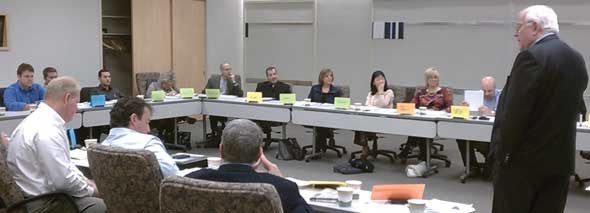Based on the feedback from participants, MANA’s Manufacturers’ Seminar in Chicago last fall was the place to be — that is, for manufacturers truly looking to hit the ground running as they implement plans to partner with independent manufacturers’ reps.
Seminar leaders Hank Bergson and Kris Hefley promise more of the same in May as they look to educate a fresh crop of manufacturers that are taking their first steps in outsourcing their sales efforts or want to enhance their results from an existing rep sales force.
Scheduled for May 2-3, at the American Management Association Executive Conference Center in Chicago, the day-and-a-half seminar will cover the topics new and seasoned principals will expect, but there is more to the seminar than just the sum of its topics, says Bergson. “The seminar format provides a unique opportunity for in-depth coverage of a number of subjects that manufacturers must consider prior to making a major marketing decision.”
Drawing upon their extensive history of working with manufacturers and reps, Bergson and Hefley point to the following subjects that are bound to come up during the seminar’s sessions.
How can I determine if reps or a direct sales force are going to be most effective for me?
Bergson acknowledges, “That’s certainly a key question that we’re more than ready to discuss. Interestingly, there are generally two areas that need to be looked at in anticipation of the decision:
- The first is the need to conduct an economic analysis using reps or a direct sales force. That’s something that we help manufacturers with during the seminar. Part of this analysis entails a look at the cost and services needed to support the direct salesperson vs. the independent rep. Once you consider those costs, the decision can become a bit clearer.
- The other consideration is the management of reps. Manufacturers must realize that reps are managed and motivated differently than a factory sales force. A lot also depends on the personality and management style of the manager, and that needs to be factored into the decision.”
Where do I find reps and how will I know they will be effective for me in the field?
Hefley explains that in general it’s fairly easy to find reps, “But that doesn’t mean the reps you find will do a good job repping your line.” He adds that lists of reps can be obtained anywhere from the Yellow Pages, to rep associations, consultants, Google searches, referrals at trade shows, or from existing customers.
“The critical task here is for the manufacturer to perform his due diligence in making his choice. The manufacturer has to be as certain as he can be that the rep he chooses is the most cost-effective in bringing his product to market in a given territory. This is something we go into great detail about during the seminar.”
How do I know I’ll get a fair amount of the rep’s selling time?
Bergson emphasizes that “Time is a misquoted measurement. What’s much more important is for the manufacturer to understand and appreciate the concept of synergistic selling and to know whether you have synergy with his other lines. Reps don’t divide their time mathematically, but will represent many lines on a given sales call. Here’s the concept we concentrate on in the seminar: How can the manufacturer incent the rep to the point where he becomes the rep’s ‘emotional favorite’? Do you pay well and are you fun to work with? If the answer is yes to both questions, you get more of his mindshare.”
Can I expect reps to provide me with written reports on their sales calls?
Hefley advises that “I don’t know that you need them. Instead, you should have excellent communication between yourself and your reps as to what’s going on. What you really want is regular heads-up communication about important matters in the territory.”
Since I’m new to working with reps, how do I know how much commission to pay?
That’s always a difficult question to answer, says Bergson. “It’s important to keep in mind that no one size fits all. What Kris and I do during the course of the seminar is to speak with manufacturers on a group and an individual basis in an effort to accurately analyze what makes sense for both them and their reps. In doing that, you’ve got to consider defining the tasks that the reps are going to perform, agree on expectations and pay them accordingly.”
Do reps work on commission only or should I expect them to require shared territorial development fees or retainers?
According to Hefley, “There’s a whole laundry list of ways to compensate reps for their efforts. One of the reasons reps are so attractive to many manufacturers is that they’re open to various ways of being compensated. We’ll cover many of those approaches.”
What’s preferable, written or verbal agreements?
While acknowledging that he’s familiar with any number of reps who have had successful verbal agreements with principals over the years, Bergson says it’s probably a good idea to put down the rules of the agreement in writing. “The problem with the verbal agreement,” he says, “is that while it might work well for many years, what happens when the ownership of the principal changes or when someone new (e.g., a new national or regional sales manager) moves in and the situation changes?” He adds that this subject always comes up in the seminar and as usual it will be covered in detail.
What’s the best way for the manufacturer and the rep to arrive at and agree upon mutual expectations?
Both men agree that this gets back to the importance of communication.
“You can never communicate too much,” advises Bergson. “I’m not saying that stilted or formal written communication is needed. What I’m talking about is the need to stay in touch at all levels of the manufacturing and rep firms.”
Hefley adds, “One of the major points we emphasize is the need for constant and meaningful communication. We talk to manufacturers about the need for hosting reps at their factories, visiting with reps in the field and sharing their plans with reps. What it all gets down to is having both sides agree that they’re moving in the same direction and that can only be done by communicating.
“I know there are some people out there who maintain they’re happy if I send the order and you send me the money — but in the meantime just don’t bother me. That simply doesn’t work anymore in today’s business environment.”
Bergson and Hefley emphasize that this sampling of subject matter that’s bound to be included in the MANA Manufacturers Seminar simply serves as the tip of an informational iceberg. For more information concerning the seminar, visit www.manaonline.org and refer to the article on the first seminar that appeared in the January 2013 issue of Agency Sales magazine.



